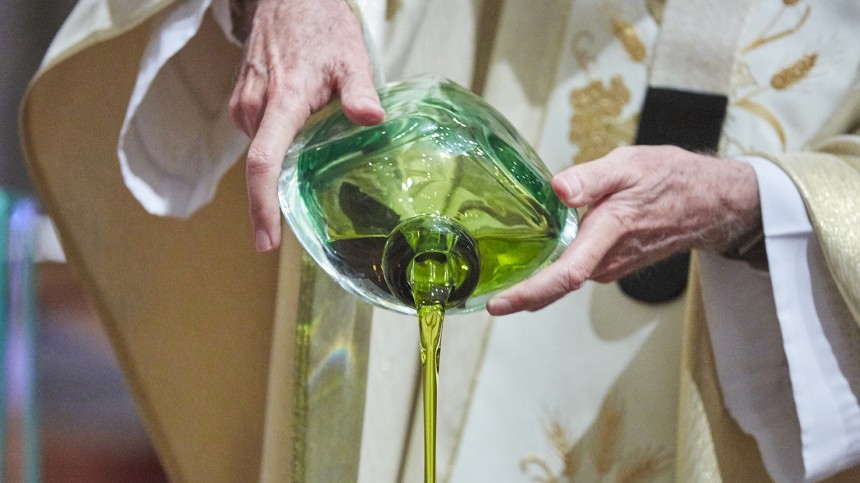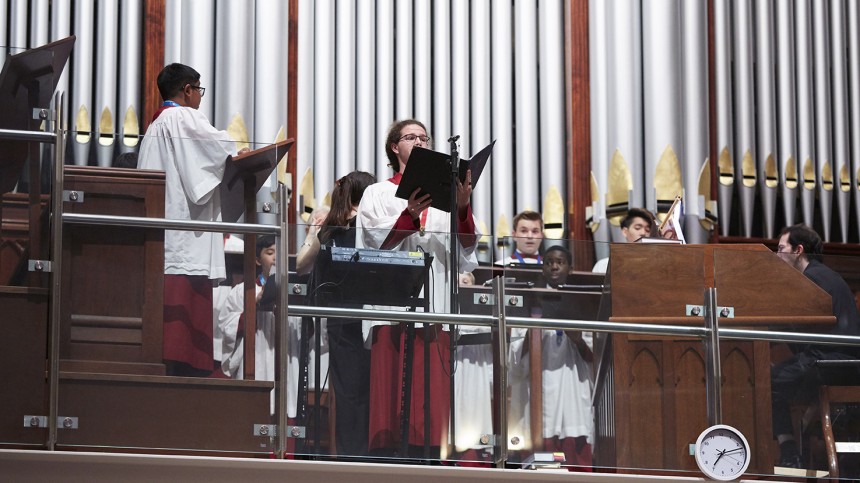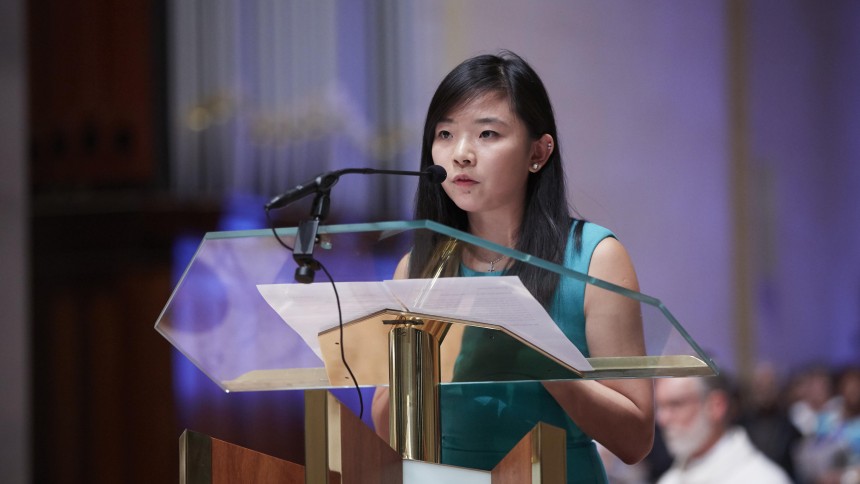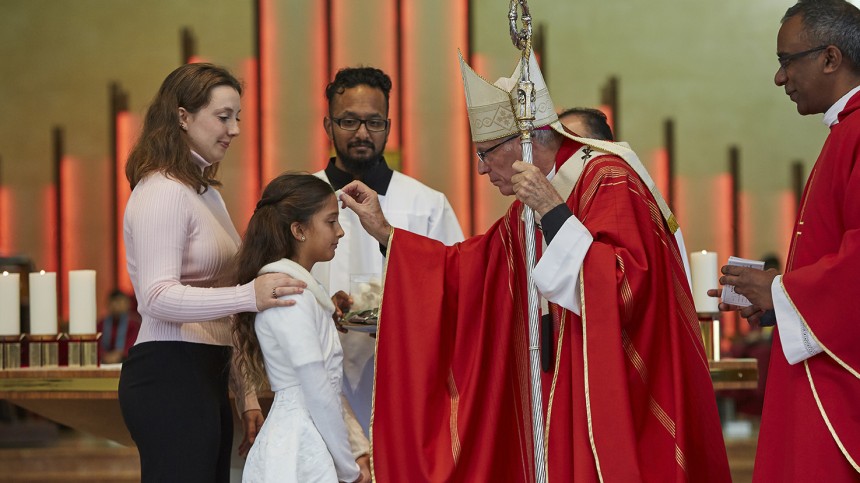LITURGICAL FORMATION & RENEWAL PROGRAM: Liturgy transforms us by the presence of Christ
By belonging to a community of worship and prayer, we can be an example of Christ’s love, mercy and forgiveness to the wider community in which we live, Centre for Liturgy Director, Sr Kerry Willison has said.
Speaking on the launch of the second video for the Liturgical Formation and Renewal Program, Sr Kerry explains that liturgy comes from a Greek term leitourgia meaning “public work or work done on behalf of the people.”
“Liturgy can also refer to a community doing something together actively,” Sr Kerry said.
“Each time we celebrate a liturgical ritual of the church, it is an opportunity for us to open ourselves to the words and actions of each part of the ritual and allow ourselves to be transformed by the presence of Jesus Christ,” she said.

Archbishop Costelloe pours oil during the 2022 annual Chrism Mass. Speaking on the launch of the second video for the Liturgical Formation and Renewal Program, Sr Kerry explains that liturgy comes from a Greek term leitourgia meaning “public work or work done on behalf of the people.” Photo: Ron Tan.
The Liturgical Formation and Renewal Program, launched on Ash Wednesday in parishes across the Archdiocese, aims to encourage the Perth Catholic community to awaken a renewed love for and awareness of the extraordinary gift we have in the Eucharist, in the Mass.
Leading the program is the Episcopal Vicar for Education and Faith Formation, the Very Rev Fr Vincent Glynn, supported by Centre for Liturgy Director, Sr Kerry Willison RSM, Director of Religious Education at Catholic Education Western Australia, Deacon Mark Powell, Director of the Centre for Faith Enrichment, Dr Marco Ceccarelli and Catechist Services Field Officer, Mildred Rego.
During the four weeks of lent, video messages highlighting an understanding of What is Sacramentality, Why we Gather to celebrate Liturgy, Signs and Symbols in the Liturgy and What is Liturgy, will be shown in our parish communities.
The videos feature Fr Vincent Glynn, Sr Kerry Willison RSM and Mildred Rego.
Speaking to The Record about What is Liturgy, Sr Kerry said that in Pope Francis’ recent document Desiderio Desideravi, which means ‘I have earnestly desired’, he shares his reflections on the central nature of the Liturgy in the life of the Church.

Cathedral Cantor Joshua Adams sings during Mass at St Mary’s Cathedral. Speaking on the launch of the second video for the Liturgical Formation and Renewal Program, Sr Kerry Willison RSM said each time we celebrate a liturgical ritual of the church, it is an opportunity for us to open ourselves to the words and actions of each part of the ritual and allow ourselves to be transformed by the presence of Jesus Christ. Photo: Ron Tan.
“He goes on to say that he is simply offering prompts or cues for reflection that can aid in the contemplation of the beauty and truth of the Christian celebration,” Sr Kerry said.
“In Baptism our body is washed, and we are spiritually cleansed, in Confirmation, hands are laid on the head of a person and the Spirit comes alive in our hearts. In the Eucharist, we eat and drink the Body and Blood of Christ and we are nourished with the spirit to live out our faith in our day to day lives,” she said.
Liturgical ritual is not entertainment, highlights Sr Kerry.
“In the life of the Church, the liturgy is expressed in rituals where those gathered participate in symbolic actions by praying together, singing, listening to the scriptures and various gestured,” she said.
“Through our words, by sharing of our faith in the way we live, Jesus Christ is alive and present in the world.
“By belonging to a community of worship and prayer, we can make a difference within the church community and be an example to the wider community in which we live,” Sr Kerry said.
Speaking to participants in a course for Diocesan liturgy officials in January this year, Pope Francis encouraged liturgists to fight against “sloppy, neglected, poorly prepared” Masses, and warns against putting ritual ahead of the encounter with Christ.

The Word of God is proclaimed during Mass at St Mary’s Cathedral. Speaking on the launch of the second video for the Liturgical Formation and Renewal Program, Sr Kerry Willison RSM said that in the life of the Church, the liturgy is expressed in rituals where those gathered participate in symbolic actions by praying together, singing, listening to the scriptures and various gestured. Photo: Ron Tan.
In his address, the Pope stressed that liturgy is fundamentally about encounter with Christ, and encouraged reverent celebrations.
A key theme of Pope Francis’ address was that the “fruitful participation of God's people” ought to be prioritised, in order “to lead the people to Christ, and Christ to the people.”
Sometimes, he warned, there is a danger of putting ritual first, of “putting the rite before what it expresses”.
This approach, he said, leads to “beautiful rituals, but without strength, without flavour, without meaning, because they do not touch the heart and existence of God's people. It is Christ who makes the heart vibrate; it is the encounter with Him that draws the spirit.”
Quoting his recent Apostolic Letter Desideravo Desideravi, Pope Francis added: “A celebration that does not evangelise is not authentic.”
The Holy Father also stressed the importance of reverence in the Mass.
He suggested that, when they visit parishes, liturgists should “organise a liturgy that can be imitated, with adaptations that the community can take in to grow in liturgical life.”

Archbishop Costelloe confirms a young girl on Pentecost Sunday 2021 at St Mary’s Cathedral. Speaking to participants in a course for Diocesan liturgy officials in January this year, Pope Francis encouraged liturgists to fight against “sloppy, neglected, poorly prepared” Masses, and warns against putting ritual ahead of the encounter with Christ. Photo: Ron Tan.
In fact, he added, “to go to parishes and say nothing when faced with liturgies that are somewhat sloppy, neglected, poorly prepared, means not helping communities, not accompanying them.”
Part of this, the Pope underlined, is “care for silence”. Too often, he said, churches are noisy before and after the liturgy, but “it’s silence that prepares you for the mystery, that allows assimilation, lets the echo of the Word resonate.”
“Fraternity is beautiful,” he continued, “but it is the encounter with Jesus that gives meaning to our meeting, to our coming together. We must rediscover and value silence!”
